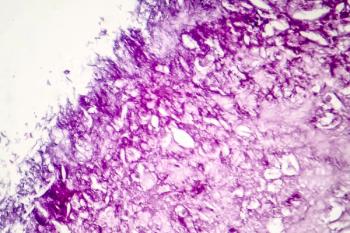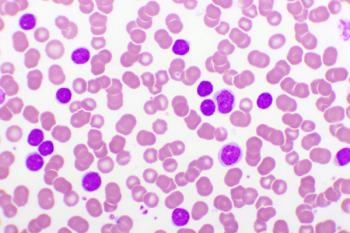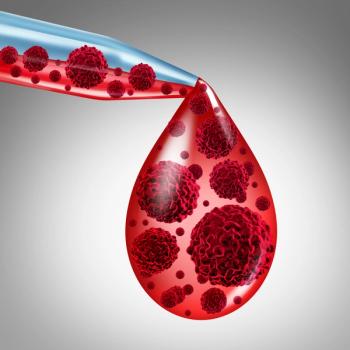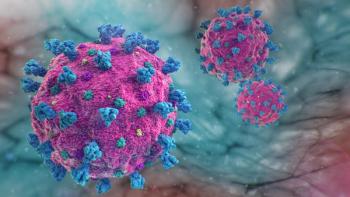
Detection of ESR1 mutations in baseline ctDNA was associated with inferior progression-free survival and overall survival in patients with advanced HR-positive breast cancer treated with exemestane versus fulvestrant.

Your AI-Trained Oncology Knowledge Connection!


Detection of ESR1 mutations in baseline ctDNA was associated with inferior progression-free survival and overall survival in patients with advanced HR-positive breast cancer treated with exemestane versus fulvestrant.

Results from NCI-MATCH support the feasibility and efficiency of using next-generation sequencing (NGS) to triage patients to investigational therapy, provided that a sufficiently large pool of agents is made available.

Researchers found that Black non-Hispanic patients with head and neck cancer present with later stage at diagnosis and receive less treatment following their diagnosis compared to patients in all other racial and ethnic groups.

A phase 1/2 nonrandomized clinical trial in patients with advanced anthracycline-naïve sarcoma indicated that the treatment combination was well tolerated in this patient population.

New research from NCI-MATCH support the feasibility and efficiency of using next-generation sequencing (NGS) to triage patients to investigational therapy, given that a sufficiently large pool of agents is provided.

This study indicated that the financial hardship associated with cancer-related employment disruption among female adolescent and young adults can be sizable, suggesting a need for interventions to aid this patient population.

The FDA accepted and granted priority review to the supplemental new drug application for osimertinib (Tagrisso) for the adjuvant treatment of patients with early-stage EGFR-mutated non-small cell lung cancer after complete tumor resection with curative intent.

Pretreatment circulating tumor DNA was found to be a reliable indicator of patient outcome for those with metastatic melanoma in the first-line immune checkpoint inhibitor (ICI) treatment setting, but not in the second-line setting.

Following the new ASCCP-led national consensus guidelines for managing abnormal cervical cancer screening tests, these new guidelines estimate risk based on an individual’s risk factors, thus allowing for more personalized care management.

The researchers hypothesized “that serum PD-L1 may identify a subgroup of patients with HER2-positive [metastatic breast cancer] who may benefit the most from the addition of novel immunotherapies to trastuzumab.”

Researchers indicated that this economic evaluation supports the widespread adoption of standard genetic testing for newly diagnosed patients with metastatic gastrointestinal stromal tumors.

This is the first study to demonstrate how a national insurer’s voluntary pay-for-performance program can successfully alter prescribing patterns among oncologists in order to provide higher-quality cancer care.

The FDA granted regular approval to venetoclax (Venclexta) in combination with azacitidine, decitabine, or low-dose cytarabine for adults 75 years or older with newly diagnosed acute myeloid leukemia, or who those have comorbidities precluding intensive induction chemotherapy.

Researchers indicated that these “findings are of direct clinical relevance and may help clinicians choose an optimal anti-myeloma regimen for patients with high-risk cytogenetic factors.”

With today being National Mammography Day, here are the latest updates in mammography research.

The breast cancer expert discussed the changes he has made in treating this patient population as a result of the COVID-19 pandemic.

The phase 3 ASTRAL-2 and ASTRAL-3 clinical studies evaluated the efficacy and safety of guadecitabine in adults with previously treated acute myeloid leukemia, and with previously treated myelodysplastic syndromes or chronic myelomonocytic leukemia, respectively.

The study established 4 cycles of rituximab, cyclophosphamide, doxorubicin, vincristine, and prednisone (R-CHOP) alone as the new standard approach for the majority of patients with limited-stage diffuse large B-cell lymphoma.

This phase 1 study found that vorinostat (Zolinza) in combination with either sirolimus (Rapamune) or everolimus (Afinitor) demonstrated clinical efficacy in patients with relapsed and/or refractory Hodgkin lymphoma and warrants further investigation.

The FDA approved an expanded label for pembrolizumab (Keytruda) as monotherapy for the treatment of adult patients with relapsed or refractory classical Hodgkin lymphoma.

New research reported that guidelines to reduce the number of opioids prescribed to patients following surgery may be missing a small group of patients that need a greater level of pain control.

This study found that immune checkpoint inhibitor therapy in patients with cancer could aggravate cardiovascular inflammation and subsequent cardiovascular or cerebrovascular events.

The study is evaluating copanlisib (Aliqopa) in combination with rituximab (Rituxan) in patients with indolent non-Hodgkin’s lymphoma who have relapsed after 1 or more prior lines of rituximab-containing therapy.

After adjustments for a number of clinical factors and factors related to access to care, the overall survival disparity among men undergoing radical prostatectomy was significantly decreased, but not eliminated, for Black men.

“In light of these findings, black patients with cancer should exercise more caution and consistently use strategies to prevent COVID-19 infection,” Chintan Pandya, MD, PhD, said in a press release.

Researchers indicated it is important to recognize these disparities that exist among racial and ethnic minorities in order to ensure routine and follow-up cancer care is delivered, even during the COVID-19 pandemic.

Among accredited US cancer centers, hospitals which serve primarily minority patients were found to be as likely as other hospitals to offer the standard of surgical care for early-stage breast cancer.

According to findings from the ASCO Quality Care Symposium, Black and Hispanic patients with cancer may be more likely to be infected with COVID-19 than white patients.

Though this study did not determine the causality, it clearly demonstrated an association between atopy and immune thrombocytopenic purpura (ITP).

“This is the first trial to report objective responses in patients with advanced urothelial cancer who had previously received immunotherapy but were ineligible for cisplatin in this setting due to inadequate kidney function or other conditions,” Roger Dansey, MD, said in a press release.